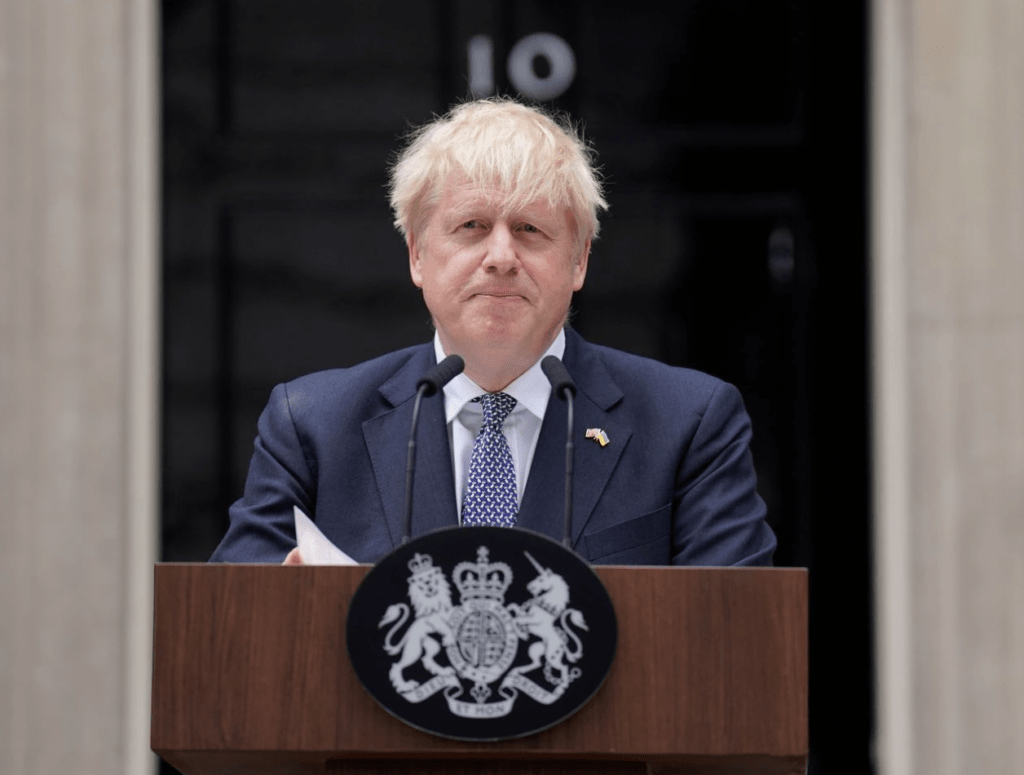Boris Johnson, Cautionary Tale for Faustian Bargainers
 AP
AP
Lisa Van Dusen
July 7, 2022
For those of us who’ve lived with Boris Johnson not as a political actor impacting our daily quality of life but as one providing a perpetual stream of spit-take fodder and armchair editing fuel, Thursday’s developments were bittersweet.
“In the last few days, I’ve tried to persuade my colleagues that it would be eccentric to change governments when we are delivering so much,” Johnson said outside Number 10 following his resignation as Conservative leader, prompting a collective spit-take at the use of “eccentric” as a jibe by a man whose hair is the most accurate representation of the technical definition of eccentric — “not placed centrally or not having its axis or other part placed centrally” — in the world. “Them’s the breaks,” Johnson said of his departure from “the best job in the world”, triggering spit-take number two.
It is tempting, in the wake of Boris de Pfeffel Johnson’s political defenestration, to say that his prime ministership serves as a cautionary tale for hubris, or perhaps for relentless, mendacious shambolism as a governing doctrine (see Cummings, Dominic…my Jan/2020 column Wanted: Self-Starting ‘Weirdos’ and ‘Misfits’, ‘Odd Skills” an Asset). There’s just so much low-hanging fruitcake to feed those takeaways.
But Johnson’s arc from the moment he veered off a successful transition from journalism to lower blast-radius politics by declaring his leadership of the Leave side of a Brexit referendum campaign lubricated by propaganda and narrowly won by corruption in February 2016 might be better processed as a cautionary tale for current and aspiring Faustian bargainers across multiple, ongoing political dumpster fires.
Johnson’s antics as both a journo known for his on-and-off relationship with the truth and as impish, zip-lining mayor of London made him the obvious chaos-agent counterpart to Donald Trump and the perfect casting choice in the role of Brexiteer-in-chief. By the time he agreed this week to limp offstage in the wake of a Dunkirkian evacuation from his government by 44 ministers and other senior officials, the democracy-degrading, European Union-discrediting, inherently unimplementable mess of Brexit was secure if not irreversible. Boris Johnson, in a way that could only be true in our current circus, is the victim of his own success.
In saner times, Johnson would not have succumbed to the quid pro quo of eventual residency in 10 Downing Street in exchange for the weaponization of his popularity and personality to rationalize a larcenous referendum outcome
Of all the performative, democracy-degrading spectacles that have unfurled on humanity’s time and dime in the post-Obama era, the one starring Johnson is arguably the most reminiscent of its organic antecedents. It contains all the components of the most spectacular British political dramas: Shakespearean machinations, breathtaking stupidity, artful succession jostling, mock shock, plus — in a twist Armando Iannucci would surely bin as too on-the-nose — a power perv named Pincher as the 21st-century reboot of the autoerotic-asphyxiator, honeytrap-chump British political scandal stars of yesteryear.
It also contains the dramatic element requisite of all Westminster immolations, self- and otherwise, of the tactically repurposed implacability that Winston Churchill’s David-and-Goliath fighting spirit made a plausible survival strategy for besieged party leaders and megalomaniacs the world over, ad infinitum.
It further contains the branding requirement of all anti-democracy grand guignols in this era of lunatic churn that its viral propaganda content obscure the alarming policy questions at play beyond the hashtags; in this case, that in saner times, Johnson would have resigned over the widely predicted consequences of Brexit months ago.
But in saner times, Johnson would not have succumbed to the quid pro quo of eventual residency in 10 Downing Street in exchange for the weaponization of his popularity and personality to rationalize a larcenous referendum outcome. In saner times, the Conservative Party would have seen that trade-off for what it was, especially in view of Johnson’s deceptively Trumpian popularity and early propaganda protection. In a political era defined by the industrialization and cyberadaptation of old school, Clintonian situational ethics and hypertactical, ends-justify-any-means-necessary ruthlessness, the hijacking of the UK Tory party by the same narrative warfare that has produced such dystopian outcomes elsewhere — most notably in America — is an invaluable lesson for potential leverage targets everywhere.
Power, like so many other things, is not what it used to be. In democracies besieged by operationalized scammery, power is the currency that buys the fraudulent use of proxies — political, judicial, propaganda and others — to achieve otherwise unachievable ends. After more than a decade of this Faustian souk and its entirely foreseeable impacts on truth, peace, order, good government, human rights and the basic coherence of public events, the cautionary tales are piling up faster than did the coercive BS on which they were built.
Boris Johnson is just one of them.
Policy Magazine Associate Editor Lisa Van Dusen was a senior writer at Maclean’s, Washington columnist for the Ottawa Citizen and Sun Media, international writer for Peter Jennings at ABC News and an editor at AP National in New York and UPI in Washington.
